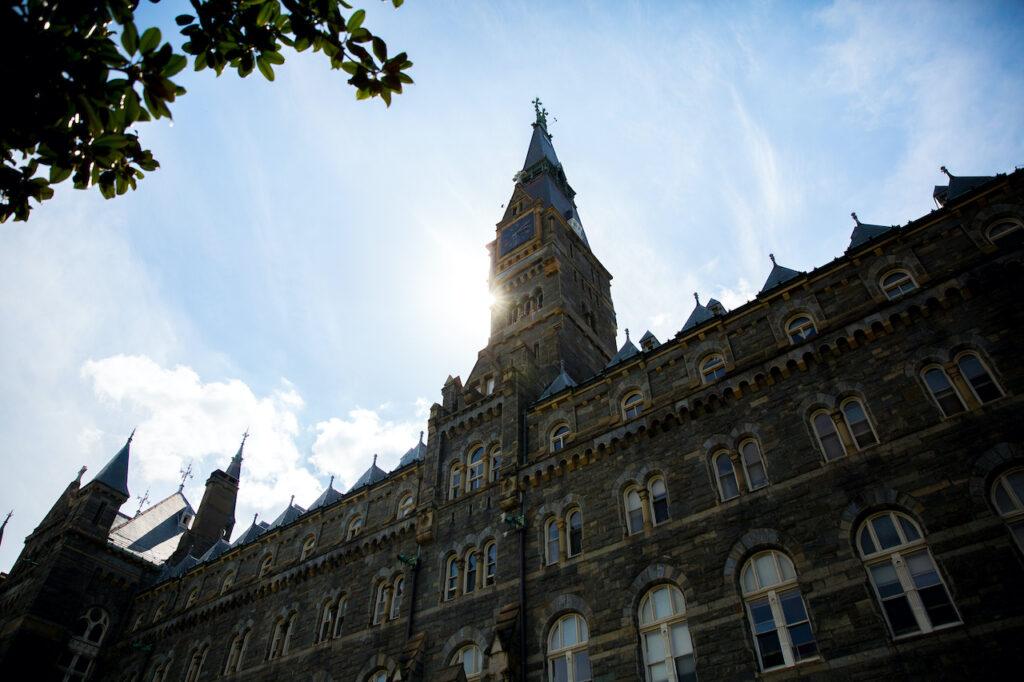The Georgetown University Student Association (GUSA) Senate unanimously passed a resolution making changes to GUSA election rules regarding payment structures at a March 20 meeting.
The changes include providing monetary compensation to members of the GUSA Election Commission (EC), which assists in running and overseeing GUSA elections, publicizing a list of candidates to the entire student body and ensuring candidates inform their supporters of possible campaign violations.
The controversy surrounding the recent GUSA executive election and the need to improve future elections prompted the changes, according to GUSA Senator Dominic Gordon (SFS ’23), who introduced the resolution.
“Our goal was one, give people more time to get on the ballot; two, pay the EC more; and three, find a way that also doesn’t lead to a proliferation of joke candidates on the ballot,” Gordon said in an interview with The Hoya. “I figured it would probably support the elections better in the future.”
The EC previously recommended against certifying Kole Wolfe (SFS ’24) and Zeke Ume-Ukeje (COL ’24) as the next GUSA executive president and vice president, citing allegations that the Wolfe-Ume campaign bribed students for their votes in exchange for alcohol, which were ultimately proved inconclusive.

The EC issued a formal warning to the campaign and cut the then-candidates’ speaking time at the town halls as a result of their alleged rule violations.
The resolution addressed the long-standing problem of the lack of support for the EC, which is usually understaffed and overworked, according to EC Chair Owen Posnett (COL ’24).
“Paying the EC, to me, the best thing about it would be that it will encourage people to sign up for the EC in the first place,” Posnett said in an interview with The Hoya. “More people want to sign up for the EC than the president, and the members of the EC would then vet those people to make sure that they actually want and are able to do the work and aren’t just in it for the money.”
Megan Skinner (SFS ’24), one of the three incoming election commissioners, said that it is important that the EC is adequately staffed and paid so that GUSA elections run smoothly and fairly.
“During the last election, I saw the importance and impact of the Election Commission’s work, and with that, their need for additional staffing,” Skinner wrote. “In this role, I hope to further develop trust and transparency in GUSA’s electoral process.”
Members of the EC will be paid in accordance with Washington, D.C. law, according to the resolution.
“All members of the Election Commission, consisting of no more than five members, shall be paid no less than the hourly minimum wage in the District of Columbia using funds given to GUSA — from the student activity fee (SAF) — by the Senate Finance and Appropriations Committee,” the resolution reads.
Directly after the GUSA executive election marked a productive time to make changes to election rules, according to Gordon.
“Part of the issue is you can’t do the changes like two days before the election without obviously being controversial, because the thing is, if you change any election rules, obviously you’re gonna favor one side or another,” Gordon said. “But if you’re not doing it before an election, there’s no established strategy yet, so people have time to adjust. You’re not really favoring anyone.”
The EC experienced staffing shortages, with only Posnett and Jessica Fiadomor (COL ’24) serving on the EC during the latest GUSA Executive election, which hindered its capacity to function well, according to Posnett.
“The ultimate logistical problem was advertising,” Posnett said. “With only two members of the EC and then three members when the campaign started, there was no physical capacity for us to advertise to the extent that we want to and also to the extent that is constitutionally required. We want to prevent that from ever happening again, because it was constitutionally illegal to have so few EC members doing so much work, and that’s why the work didn’t get finished.”
The EC should receive greater attention and support because of its importance in student body elections, according to Posnett.
“The EC should be appreciated more in the sense that GUSA should be more appreciated, understood and supported, and more at least in terms of voting, because who you vote for does materially affect other members of the student body, just like your vote in a federal or state election would,” Posnett said.














